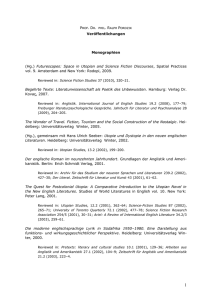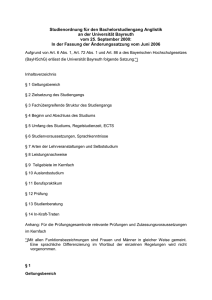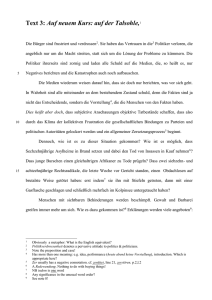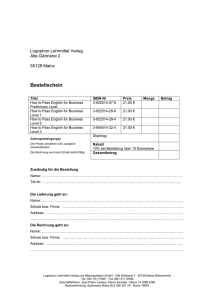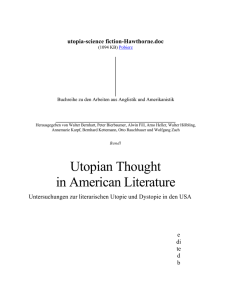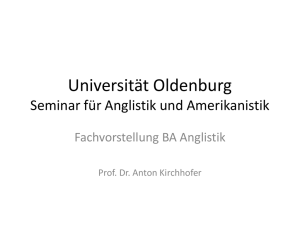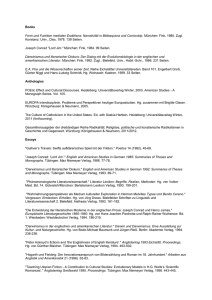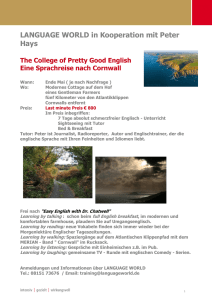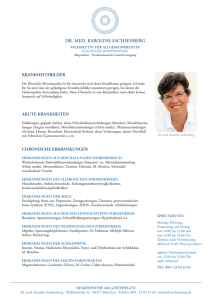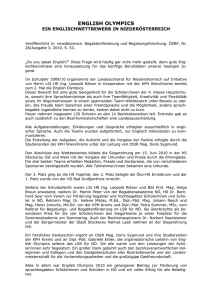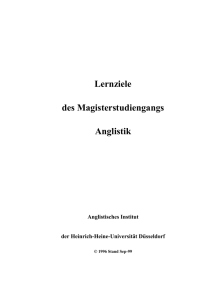PD DR
Werbung
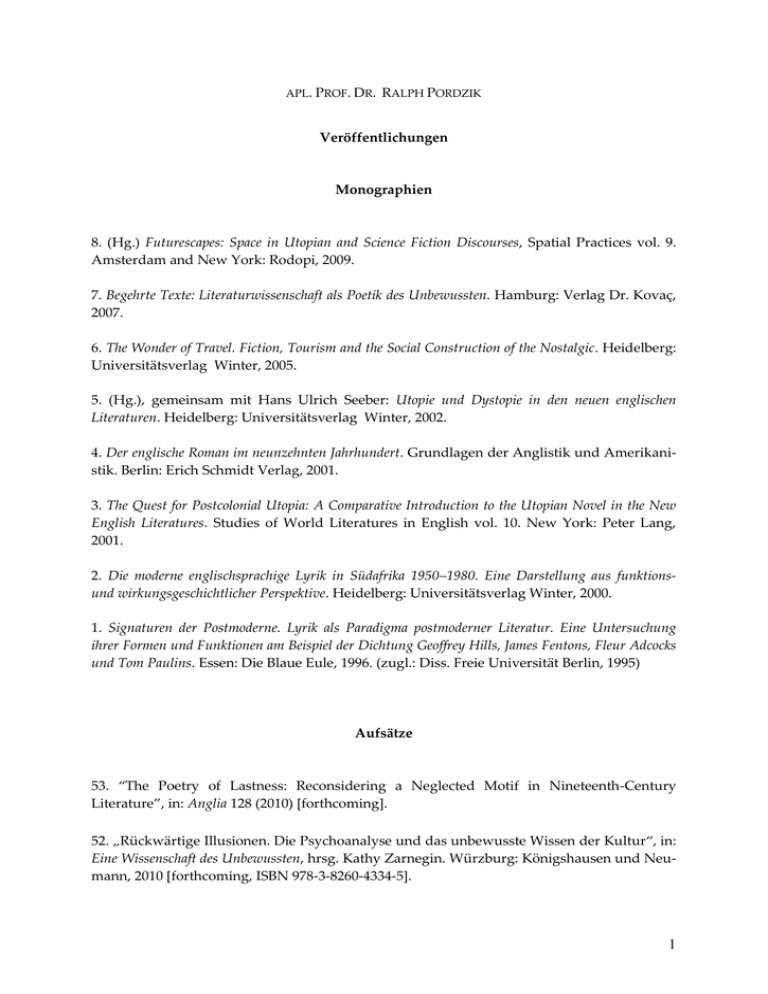
APL. PROF. DR. RALPH PORDZIK Veröffentlichungen Monographien 8. (Hg.) Futurescapes: Space in Utopian and Science Fiction Discourses, Spatial Practices vol. 9. Amsterdam and New York: Rodopi, 2009. 7. Begehrte Texte: Literaturwissenschaft als Poetik des Unbewussten. Hamburg: Verlag Dr. Kovaç, 2007. 6. The Wonder of Travel. Fiction, Tourism and the Social Construction of the Nostalgic. Heidelberg: Universitätsverlag Winter, 2005. 5. (Hg.), gemeinsam mit Hans Ulrich Seeber: Utopie und Dystopie in den neuen englischen Literaturen. Heidelberg: Universitätsverlag Winter, 2002. 4. Der englische Roman im neunzehnten Jahrhundert. Grundlagen der Anglistik und Amerikanistik. Berlin: Erich Schmidt Verlag, 2001. 3. The Quest for Postcolonial Utopia: A Comparative Introduction to the Utopian Novel in the New English Literatures. Studies of World Literatures in English vol. 10. New York: Peter Lang, 2001. 2. Die moderne englischsprachige Lyrik in Südafrika 1950–1980. Eine Darstellung aus funktionsund wirkungsgeschichtlicher Perspektive. Heidelberg: Universitätsverlag Winter, 2000. 1. Signaturen der Postmoderne. Lyrik als Paradigma postmoderner Literatur. Eine Untersuchung ihrer Formen und Funktionen am Beispiel der Dichtung Geoffrey Hills, James Fentons, Fleur Adcocks und Tom Paulins. Essen: Die Blaue Eule, 1996. (zugl.: Diss. Freie Universität Berlin, 1995) Aufsätze 53. “The Poetry of Lastness: Reconsidering a Neglected Motif in Nineteenth-Century Literature”, in: Anglia 128 (2010) [forthcoming]. 52. „Rückwärtige Illusionen. Die Psychoanalyse und das unbewusste Wissen der Kultur“, in: Eine Wissenschaft des Unbewussten, hrsg. Kathy Zarnegin. Würzburg: Königshausen und Neumann, 2010 [forthcoming, ISBN 978-3-8260-4334-5]. 1 51. “Verspätete Zukunft. Resignation und Hoffnung in angloamerikanischen Utopien der zweiten Hälfte des zwanzigsten Jahrhunderts”, in: Bluescreen. Visionen, Träume, Albträume und Reflexionen des Phantastischen und Utopischen , hrsg. Walter Delabar und Fraucke Schlieckau. Bielefeld Aisthesis, 2010, 189–205. 50. “The Gospel According to Bram Stoker: Christian Symbolism, Satan and the Ritual of the Written Text in Dracula,“ Erfurt Electronic Studies in English, 2010. http://www2.uni-erfurt. de/eestudies/eese/rahmen22.html. 49. “Closet Fantasies and the Future of Desire in E. M. Forster’s ‘The Machine Stops’”, in: English Literature in Transition 53.1 (2010): 54–74. 48. “Affective Performances: Monty Python’s Comic Deconstruction of Post-Imperial Discourse”, in: Anglistik. International Journal of English Studies 21.1 (2010): 141–57. 47. “Fiction, the Law and the Docile Body: The Uncanny Presence of Kant and the Marquis de Sade in Mary Shelley’s Frankenstein”, in: Zeitschrift für Anglistik und Amerikanistik 57.1 (2009): 109–23. 46. “Introduction: The Overlaid Spaces of Utopia”, in: Futurescapes: Space in Utopian and Science Fiction Discourses, ed. Ralph Pordzik. Amsterdam and New York: Rodopi 2009, 17–22. 45. “Persistence of Obedience: Theological Space and Ritual Conversion in George Orwell’s Nineteen Eighty-Four”, in: Futurescapes: Space in Utopian and Science Fiction Discourses, ed. Ralph Pordzik. Amsterdam and New York: Rodopi 2009, 127–43. 44. “Of Popular Spaces: Northern Heterotopias, Morrissey and the Manchester Britpop Scene”, in: Thinking Northern: Textures of Identity in the North of England, ed. Christoph Ehland. Amsterdam and New York: Rodopi 2007, 325–46. 43. “Orientalism Reconsidered Yet Again: Alexander Kinglake’s Eothen (1844) and the Discourse of Eastern Travel”, in: Symbolism. An International Annual of Critical Aesthetics 6 (2007): 305–28. 42. “Twins Abroad. Towards a Dyadic Theory of the Picaro”, in: Das Paradigma des Pikaresken. The Paradigm of the Picaresque, ed. Christoph Ehland und Robert Fajen. Heidelberg: Universitätsverlag Winter 2007, 301–14. 40. “Der verkörperte Augenblick. Überlegungen zum Ursprung und Wandel erzählerischer Strukturen in der viktorianischen Malerei zwischen 1840 und 1860 (narrative painting)”, in: Anglia 124.3 (2006): 407–31. 39. “Travels in Technotopia: Modernisation and Technology in Postcolonial Utopian and Dystopian Fiction”, in: Beyond the Black Atlantic: Relocating Modernisation and Technology, ed. Walter Göbel und Saskia Schabio. London und New York: Routledge 2006, 184–97. 2 38. “Die Zukunft als Neurose: Ein struktural-psychoanalytischer Versuch zu George Orwells Nineteen Eighty-Four“, in: Anglistik. Mitteilungen des Deutschen Anglistenverbandes 17.2 (2006): 151–64. 37. “Quebec Separatism in Canadian Utopian Fiction and the Quest for a Postcolonial Future”, in: La Revue LISA / LISA e-journal. Litératures, Histoire des Idées, Images, Sociétés du Monde anglophone, ed. Matthias Merkl, Vol. 3.2 (2005): 11–22. 36. “Kulturwissenschaft und Postcolonial Studies”, in: Kulturwissenschaft Interdisziplinär. Ed. Klaus Stierstorfer und Laurenz Volkmann. Tübingen: Narr 2004, 225–41. 35. “Anglistische Studien interkulturell – die wachsende Bedeutung postkolonialer Themen und Schwerpunkte in der deutschen Anglistik”, in: Würzburger Geographische Manuskripte. Sonderheft 7. Universität Würzburg 2004, 89–109. 34. “Narrating the Ecstatic Moment: George Gissing and the Beginnings of the Modern Short Story”, in: Arbeiten aus Anglistik und Amerikanistik 28.2 (2003): 349–62. 33. “Arrested Memories. Exoticism and Colonial Nostalgia in the Travel Writing of Robert Cunninghame Graham (1852–1936)”, in: Xenophobic Memories: Otherness in Postcolonial Constructions of the Past. Ed. Monika Gomille und Klaus Stierstorfer. Heidelberg: Universitätsverlag Winter 2003, 273–86. 32. “Travel Writings and its Discontents. Culture, Tourism and the Dynamics of Narration in Bruce Chatwin’s In Patagonia and The Songlines”, in: Anglia 121.3 (2003): 373–89. 31. “Travel Writing in an Age of Experience. The Multiple Worlds of George Henry Borrow (1803–81)”, in: Anglistentag 2001 Wien: Proceedings of the 24th Conference of the German Association of University Teachers of English. Trier: wvt 2002, 423–33. 30. “’Postcolonial’ or ‘Transcolonial’? Canadian Speculative Fiction in French and English and the Comparative Dimension of the New English Literatures”, in: Zeitschrift für Anglistik und Amerikanistik 50.2 (2002): 179–88. 29. “Utopischer und postutopischer Diskurs in den neuen englischsprachigen Literaturen,” in: Pordzik und Seeber (eds.), Utopie und Dystopie in den neuen englischsprachigen Literaturen. Heidelberg: Universitätsverlag Winter, 2002: 9–26. 28. “Haunted Territories of the Mind. Zur Entwicklung der utopischen Literatur in Irland seit dem neunzehnten Jahrhundert”, in: Pordzik und Seeber (eds.), Utopie und Dystopie in den neuen englischsprachigen Literaturen. Heidelberg: Universitätsverlag Winter, 2002, 109–27. 27. “Reinventing the Future(s): Peter Carey and the Dystopian Tradition in Australian Fiction”, in: Missions of Interdependence. ASNEL Conference Papers 6. Ed. Gerhard Stilz. Amsterdam and New York: Rodopi, 2002, 285–98. 26. “After the Linguistic Turn. Neo-Pragmatist Theories of Reading and the Interpretation of Modern Literature”, in: Arbeiten aus Anglistik und Amerikanistik 27.1 (2002): 3–14. 3 25. “Off the Beaten Track: Victorian Culture and the Refashioning of Late Romantic Travel Writing”, in: In the Footsteps of Queen Victoria. Wege zum viktorianischen Zeitalter, ed. Christa Jansohn. Münster: LIT, 2002, 315–30. 24. “Fictions of Empire. Imperial Vision in the Later Fiction of George Gissing, with special Regard to Henry Ryecroft (1903)”, in: Erfurt Electronic Studies in English 8 (2002). http://webdoc.gwdg.de/edoc/ia/eese/eese.html 23. “John Gray (1866–1934): Priest, Poet and Utopist”, in: Anglistik 13.2 (2002): 43–53. 22. “Nationalism, Cross-Culturalism and Utopian Vision in South African Utopian and Dystopian Writing, 1972–1992, with an annotated bibliography”, in: Research in African Literatures. Special Issue on Nationalism 32.3 (2001): 177–97. 21. “‘A fine ghost in a case of iron’: Zum Verhältnis von Dekonstruktion und künstlerischem Projekt im Romanwerk von Nathaniel Hawthorne”, in: Arbeiten aus Anglistik und Amerikanistik 26.1 (2001): 13–26. 20. “A Postcolonial View of Ireland and the Irish Conflict in Anglo-Irish Utopian Literature since the Nineteenth Century”, in: Irish Studies Review 9.3 (2001): 331–47. 19. “Gelebte Zukunft. Aldous Huxley, Marge Piercy und die Ambiguisierung der positiven Utopie in den USA und in England, 1960–1980”, in: Anglistik 11.2 (2000): 74–89. 18. “Mapping the Future(s): Formen und Funktionen der Metafiktionalität im englischen utopischen Roman”, in: Anglia 118.1 (2000): 41–66. 17. “Magical Realism and the Transformation of Dystopian Space. A Comparative Approach to Postcolonial Speculative Fiction”, in: Anglistentag 1999 Mainz: Proceedings of the 22nd Conference of the German Association of University Teachers of English. Trier: wvt, 2000, 507–18. 16. “An African Utopographer: Ben Okri’s Astonishing the Gods and the Quest for Postcolonial Utopia”, in: Zeitschrift für Anglistik und Amerikanistik 48.1 (2000): 44–56. 15. “Realismus und Naturalismus. Überlegungen zur ästhetischen Wirkungsstruktur erzählender Texte des neunzehnten Jahrhunderts am Beispiel der Romane Thomas Hardys und George Gissings”, in: Sprachkunst 31.1 (2000): 69–84. 14. “James Ballard’s Crash and the Postmodernization of the Dystopian Novel,” in: Arbeiten aus Anglistik und Amerikanistik 24.2. (1999): 77–94. 13. “’No Other Mystery but Reckoning or Counting’: Margaret Cavendishs The Blazing-World und die Konstruktion des wissenschaftlichen Weltbilds im 17. Jahrhundert”, in: GermanischRomanische Monatsschrift 49.3 (1999): 275–90. 12. “’The Shade is Bad for Singers’. Szenarios kultureller und individueller Grenzüberschreitung in der Lyrik der Südafrikanerin Ruth Miller”, in: Zeitschrift für Anglistik und Amerikanistik 46.2 (1998): 157–72. 4 11. “’No longer need I shout freedom in the house’: Arthur Nortje, the English Poetical Tradition and the Breakdown of Communication in South African English Poetry”, in: English Studies in Africa 41.2 (1998): 35–53. 10. “New Spaces Made Articulate. Zur Transformation von Raum, Region und Lebenswelt im Werk des südafrikanischen Dichters Sydney Clouts”, in: Sprachkunst 29.1 (1998): 105–25. 9. “Monologizität versus Dialogizität: Intertextualität in der Lyrik am Beispiel von Geoffrey Hills Mercian Hymns”, in: Anglia 116.1 (1998): 30–55. 8. “Streifzüge durch Hunter’s Paradise: Douglas Livingstones Phänomenologie Afrikas in Sjambok, and Other Poems from Africa,” in: Poetica 30.1/2 (1998): 200–15. 7. “Artful Negotiations. Zur dialogischen Funktion der Poetizität im Frühwerk des südafrikanischen Lyrikers Dennis Brutus,” in: Arbeiten aus Anglistik und Amerikanistik 23:1 (1998): 31–49. 6. “Das poetische Ich als dezentrierte Persönlichkeitsstruktur. Eine Darstellung am Beispiel von Geoffrey Hills Gedichtzyklus The Songbook of Sebastian Arrurruz”, in: Sprachkunst 28.1 (1997): 97–110. 5. “Postmoderne Lyrik als Negativutopie. Untersuchungen zur Karnevalisierung der Dichtung am Beispiel des Martian Poet James Fenton”, in: Arbeiten aus Anglistik und Amerikanistik 21:1 (1996): 33-61. 4. “Die Postmoderne als eine Ästhetik des Erhabenen: Barocke Elemente in Geoffrey Hills Sonettzyklus ‘Lacrimae, or Seven Tears Figured in Seven Passionate Pavans’”, in: Zeitschrift für Anglistik und Amerikanistik 44.1 (1996): 11–26. 3. “Lyrik als Geschichtspoetik. Über einige Aspekte des New Historicism im Werk Tom Paulins”, in: Germanisch-Romanische Monatsschrift 46.2 (1996): 216–30. 2. “From Inside the Funhouse: Aspekte der Dialogizität und des Karnevalesken in Thomas Pynchons Gravity’s Rainbow”, in: Anglia 113.3 (1995): 330–58. 1. “History as Poetry. Über einige historische Aspekte in der jüngeren Lyrik Geoffrey Hills“, in: Arbeiten aus Anglistik und Amerikanistik 19:2 (1994): 195-216. Rezensionen und Lexikonbeiträge 11. Rez. The Cambridge Companion to Travel Writing. Ed. Peter Hulme and Tim Youngs. In: Symbolism. An International Annual of Critical Aesthetics 6 (2007). 469–81. 5 10. Rez. Stephan Laqué, Hermetik und Dekonstruktion: Die Erfahrung von Transzendenz in Shakespeares Hamlet. Heidelberg: Universitätsverlag Winter, 2006. In: Anglia 125.1 (2007): 144–47. 9. Rez. Simon J. James, Unsettled Accounts. Money and Narrative in the Novels of George Gissing. London: Anthem Press, 2003. In: Anglia 123.1 (2005): 175–80. 8. Rez. Christopher Kendrick, Utopia, Carnival, and Commonwealth in Renaissance England. Toronto: U of Toronto P, 2004. In: Anglia 123.4 (2005): 726–32. 7. Rez. Christoph Reinfandt, Romantische Kommunikation. Zur Kontinuität der Romantik in der Kultur der Moderne. Heidelberg: Universitätsverlag Winter, 2004. In: Anglia 122.4 (2004): 740– 45. 6. Rez. Wolfgang Wicht, Utopianism in James Joyce’s Ulysses. In: Anglistik 15.2 (2004): 178–84. 5. Rez. Cambridge Companion to William Blake, ed. Morris Eaves. Cambridge: Cambridge UP, 2002. In: Anglia 122.2 (2004): 334–38. 4. “Postcolonial Utopian and Science Fiction”. In: Encyclopedia of Postcolonial Literatures in English, ed. Benson, Eugene & C. W. Connolly. London—New York: Routledge, 1994. 3. Rez. The Norton Anthology of Theory and Criticism, ed. V. B. Leitch et al., New York: Norton, 2001. In: Anglistik 14.2 (2003). 2. Rez. Hans-Werner Ludwig und Lothar Fietz (Hg.): Poetry in British Isles. Non-Metropolitan Perspectives, in: GRM 47 (1997): 191–93. 1. Rez. Dorothea Kupferschmidt-Neugeborn, ‘Heal into time and other people’. Schamanismus und Analytische Psychologie in der poetischen Wirkungsästhetik von Ted Hughes, in: GRM 47 (1997): 481–83. 6
